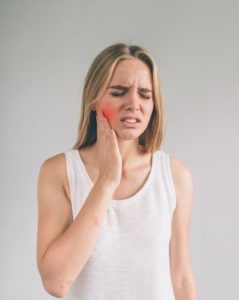My tooth hurts when I bite! What’s doing that? What is a cracked tooth?

- The tooth is sore because it is getting used too much. Your tooth is attached to the bone by a thin ligament that is only as thick as a few sheets of paper. If you have been eating a lot off hard things like ice, nuts, hard candy and the like, or clenching and grinding your teeth; both of these put more stress on that ligament than Mother Nature intended it to take on, and the ligament gets sore. And when the ligament gets sore, the tooth hurts to biting. This can also happen if you are chewing and bite something hard unexpectedly, like an old maid in popcorn. The pain associated with this ‘bruised ligament’ is usually described as a dull, ache, throbbing pain.Of course, the best way to treat this is to do what my mom used to say: “well then don’t do that!” Eating softer foods, watching your muscles and stopping if you are clenching, and taking some anti-inflammatories like ibuprofen are the easiest way to take care of this problem.
- There could be a gum infection around the tooth. Some of the inflammation and swelling from a gum infection may get into the ligament and make it sore to bite on that tooth. Patients usually describe this like the bruised ligament; dull, achy, throbbing pain.Brushing and flossing the area really well may clear this up. An anti-bacterial rinse would be helpful. If that doesn’t work, then you may have to come into the office and have the area cleaned to get out of there what ever is causing the infection.
- Possibly the pulp of the tooth is abcessed. Some of that infection will get into the ligament and make the tooth very sensitive to biting. This pain is usually very annoying and can interfere with normal activities like sleep and eating. It is usually described as a sharp, shooting, stabbing pain.If this is the case, the tooth will need a root canal to remove the infected pulp, or the tooth will need to be taken out. The pulp becomes basically a very nasty splinter, and needs to get out of there to get better.
- Maybe the bite isn’t ‘even’. Our teeth want what dentists delightfully call ‘mutually protected occlusion”; all the teeth should hit at about the same time. If there are only a few teeth hitting first, as you just bring your teeth together to bite, those few teeth will get sore (bruised) because the ligament is under too much stress.This usually best treated by doing some minor adjusting (grinding) on the teeth to get most of the teeth hitting at approximately same time.
Possibly, you have a cracked tooth
These teeth have hurt to bite on for at least 2 weeks, and the pain is described as a brief sharp, shooting, electrical shock-type pain. In this case, the crack extends into to the deeper, sensitive part of your tooth, and the crack flexes ever so slightly when you bite down on that part of your tooth. And because the pulp is involved, the pain is more significant. Occasionally these teeth may become sensitive to hot or cold things.
Now it should be made clear here that as we get older, our teeth accumulate small cracks we can see, especially in our back teeth. If fact, after the age of 40 or so, cracks in our teeth are a very common finding. The BIG difference here is these cracks don’t hurt when we bite or chew. Are these cracks a weak point in our tooth? Yes, to an extent. But it I would never recommend treatment just on the basis of the presence of cracks. In all likelihood they’ll be there your whole life and never cause any trouble.
If has been painful to biting for a while, I try to determine the part of the tooth that is flexing. If the whole tooth hurts, then I may have to consider if the pulp is dying or dead. But if only one, possibly two cusps are painful, that indicates the cracked tooth.
